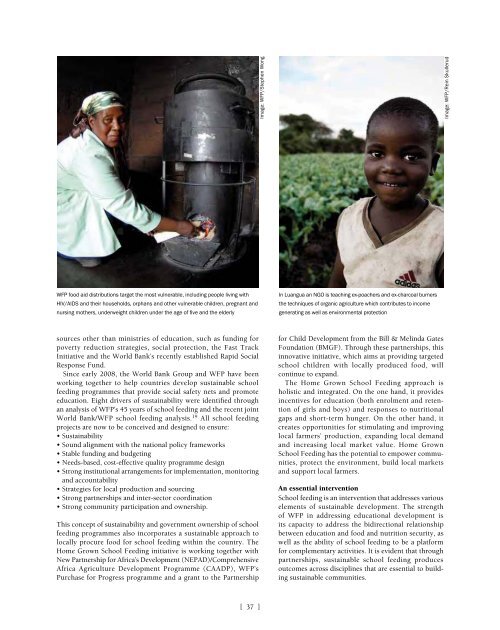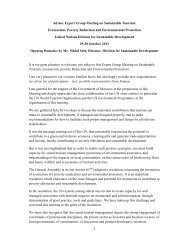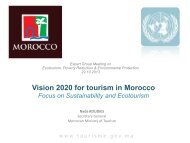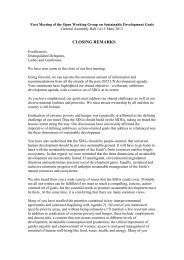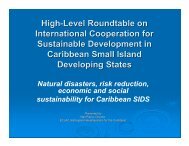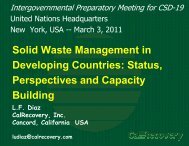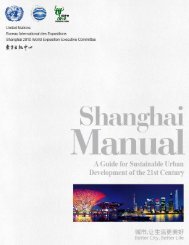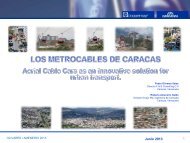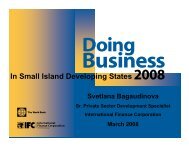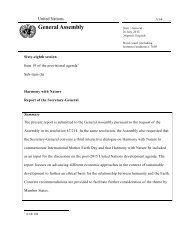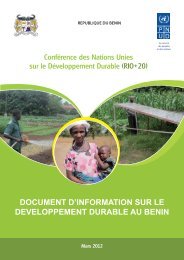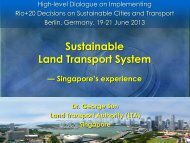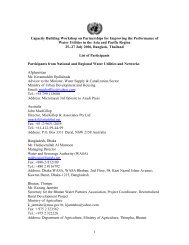Tomorrow today; 2010 - unesdoc - Unesco
Tomorrow today; 2010 - unesdoc - Unesco
Tomorrow today; 2010 - unesdoc - Unesco
Create successful ePaper yourself
Turn your PDF publications into a flip-book with our unique Google optimized e-Paper software.
Image: WFP/Stephen Wong<br />
Image: WFP/Rein Skullerud<br />
WFP food aid distributions target the most vulnerable, including people living with<br />
HIV/AIDS and their households, orphans and other vulnerable children, pregnant and<br />
nursing mothers, underweight children under the age of five and the elderly<br />
In Luangua an NGO is teaching ex-poachers and ex-charcoal burners<br />
the techniques of organic agriculture which contributes to income<br />
generating as well as environmental protection<br />
sources other than ministries of education, such as funding for<br />
poverty reduction strategies, social protection, the Fast Track<br />
Initiative and the World Bank’s recently established Rapid Social<br />
Response Fund.<br />
Since early 2008, the World Bank Group and WFP have been<br />
working together to help countries develop sustainable school<br />
feeding programmes that provide social safety nets and promote<br />
education. Eight drivers of sustainability were identified through<br />
an analysis of WFP’s 45 years of school feeding and the recent joint<br />
World Bank/WFP school feeding analysis. 19 All school feeding<br />
projects are now to be conceived and designed to ensure:<br />
• Sustainability<br />
• Sound alignment with the national policy frameworks<br />
• Stable funding and budgeting<br />
• Needs-based, cost-effective quality programme design<br />
• Strong institutional arrangements for implementation, monitoring<br />
and accountability<br />
• Strategies for local production and sourcing<br />
• Strong partnerships and inter-sector coordination<br />
• Strong community participation and ownership.<br />
This concept of sustainability and government ownership of school<br />
feeding programmes also incorporates a sustainable approach to<br />
locally procure food for school feeding within the country. The<br />
Home Grown School Feeding initiative is working together with<br />
New Partnership for Africa’s Development (NEPAD)/Comprehensive<br />
Africa Agriculture Development Programme (CAADP), WFP’s<br />
Purchase for Progress programme and a grant to the Partnership<br />
for Child Development from the Bill & Melinda Gates<br />
Foundation (BMGF). Through these partnerships, this<br />
innovative initiative, which aims at providing targeted<br />
school children with locally produced food, will<br />
continue to expand.<br />
The Home Grown School Feeding approach is<br />
holistic and integrated. On the one hand, it provides<br />
incentives for education (both enrolment and retention<br />
of girls and boys) and responses to nutritional<br />
gaps and short-term hunger. On the other hand, it<br />
creates opportunities for stimulating and improving<br />
local farmers’ production, expanding local demand<br />
and increasing local market value. Home Grown<br />
School Feeding has the potential to empower communities,<br />
protect the environment, build local markets<br />
and support local farmers.<br />
An essential intervention<br />
School feeding is an intervention that addresses various<br />
elements of sustainable development. The strength<br />
of WFP in addressing educational development is<br />
its capacity to address the bidirectional relationship<br />
between education and food and nutrition security, as<br />
well as the ability of school feeding to be a platform<br />
for complementary activities. It is evident that through<br />
partnerships, sustainable school feeding produces<br />
outcomes across disciplines that are essential to building<br />
sustainable communities.<br />
[ 37 ]


